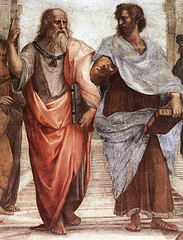
Henry County, Ky. Those of us foolish enough to call ourselves “conservative” are forced to admit that culturally and politically at least we live amidst less and less worth conserving. We can and should continue to mind our own business, and tackle daily life as cheerfully as possible, but some days one wants to take up the fight for the reformation of this bloated and addled culture of ours. Where to find a cudgel? With a culture on the skids, the regressively-minded must acknowledge that it is not enough to look back a decade or two, or a lifetime or two, for what we would restore and retain. We have to look back a good deal further than that.
While Thomas Fleming is not the first or the only to make this argument, he has long been making it, and it is one that comes naturally to a Greek Ph.D., a traditionalist Catholic, and the longtime editor of the paleoconservative magazine Chronicles. The central argument of his 2004 book, The Morality of Everyday Life: Rediscovering an Ancient Alternative to the Liberal Tradition, is that the traditions of the ancient Greeks, Jews, Romans, and Medieval Christians (as well as Eastern cultures) can provide us with tools for sorting through the moral dilemmas of daily life much better than what Enlightenment ethicists and their modern children offer us. I take up the book here because it is likely you have not read it.
Universality, rationality, individualism, objectivity, and abstract idealism are the hallmarks of philosophy since the 18th century, and these ideas have trickled down to the rest of us as the tele-popularlized ethos of our “meritocracy,” the college-educated ideal of self-fulfillment as the highest good, the United Nations’ stated belief in blind international justice. It is no coincidence, Dr. Fleming says, that the emergence of this kind of individualistic and rationalistic idealism came about in opposition to traditional Christianity. For several centuries now in the West we have put a great deal of effort into replacing the God that is Great with a very little god, who is made not in His image but our own.
And whatever this has done for the personal wealth of the United States’ uppermost crust, it has been an ethical, social and even logical loss for all of us. So Dr. Fleming goes back, and unchops the logic that lies behind such prevalent impossibilities as universal brotherhood, global villages, international free trade, world citizenship, and the Rights of Man. These invasive cliches are the hardy perennial weeds—the ground ivy and thistles—of the ethical garden.
The Classical Liberalism that is the common source for what we now think of as both Left and Right is not just deracinating but demands a superhuman, he says. And when asked to become godlike, people often become subhuman instead. “As the liberal tradition has unfolded,” Dr. Fleming writes, “it has made increasingly impossible demands upon men and women who, confronted with the choice between moral heroism and amorality, have no choice but to become amoral.” Or simply to do nothing. If I accept the idea that every person in the world has a right to clean water, how am I going to provide it? How will I feed India?
In opposition Dr. Fleming cites Greek philosophers, Roman law, church fathers and Jesus Himself to support the argument for personal ties and particularity—what most of us would call common sense and common humanity. None of us is capable of being a philosopher king, bestowing a godlike judgment from on high, free of prejudice and any shred of self-interest. For Christians, thank goodness, even our God is not godlike in that way–it is His fatherly prejudice in our favor that gives us any hope. What Dr. Fleming is talking about are circles of interlocking relationships, duties and obligations to people we know that enmesh us like a coat of mail. Also like a coat of mail, they can be very heavy.
Hence the answers he offers are not easy, since “the wretched depravity of particular duties” (as Thomas Jefferson so vividly called them) to our aging parents, our growing children, our deeply depressed best friend or our cross-town neighbor whose house just burned can make great demands on our energy and purse. This is a book of modern casuistry, and throughout it Dr. Fleming works through the gray areas of conflicting loyalties and demands to make a best (but not easiest) case.
Certainly it is much easier to practice charity by writing a check to an NGO in Africa than to feed daily at your own table the mentally ill son of an old friend (as certain neighbors here do). But the money spent at home is much more likely to be spent usefully, and my neighbors are giving their friend’s son much more than food. The result of modern ethics, and of any do-gooding done at a distance, is twofold: first, any bureaucracy tends to absorb our effort and our money into itself, and second, palliating our consciences long-distance tends to weaken the ties to home, family, place and polis, without replacing those ties with anything of any strength. As we Americans move on physically and emotionally, and leave behind us the people and places we are most beholden to, we can’t easily replace their purpose. No wonder we turn to the opiates of shopping and television (or opiates). Nature abhors a vacuum.
Years ago I read an interview with a Washington Post editor who felt than as an overseer of the editorial page he had to maintain strict objectivity. To him that meant that on certain divisive issues, such as abortion, he could have no opinion. It was not that he suppressed his opinion. He would not let himself reach a personal decision on the issue, because only by having no opinion, he believed, could he fairly edit the opinions of others. It was a remarkable admission, but this is where the logic of objectivity will take a man, who holds onto it as an ideal in the teeth of all real logic. To such arguments for moral paralysis and the refusal to think Tom Fleming offers in this book (as he does other places) highly particular and welcome alternatives—news so old it is new again.




13 comments
David
Every alms-giving is a sacramental act. If it is reduced to utilitarian concerns it is robbed of all it’s power. We do not help people to establish justice. We do not help them so they in turn might become “productive” members of society (at least in terms of their utility to the community). We do not help people “simply” to fill their aching bellies.
We should not concern ourselves primarily with the usefulness of our compassion.
We help people because we are affirming our common humanity in Christ, or brotherhood in the human race. We are connecting ourselves to them in a sacred way. We humanize them, personalize them. All love is particular in this sense. No one “loves people”. We love particular person in acts of kenotic kindness.
We pour ourselves into one another. We imitate Christ. We participate in His life by doing what He does.
Now if you aren’t particularly religious, there are still philosophical and poetic overtones to this line of thinking that can resonate with the classically conservative.
We belong to each other, not in some fluffy new agey nonsense, but we are intrinsically linked in life to parents, communities, ancestors and progeny. We don’t belong to ourselves.
Peter
I think this offers an important warning. I certainly do know those people, even in my own family, who read progressive/ socialist literature, and yell at you with anger if you question any of it, and profess great love for the poor, but every day hurt those closest to them. So I think this book sounds like a good corrective to that. BUT, do we really not have any duties to those who are poorest and suffering most in the world? Did Jesus not say, “What you do to the least…” I live in an affluent area, and I believe in helping and serving those around me, but I cannot pretend that they are in any way the least among us. I cannot pretend that I am fully living up to Christ’s radical call to love simply by doing the dishes after a filet dinner, when in other places in the world people are dying slow, tortorus deaths because of sickness or starvation. That can hardly be what Christ came to teach us.
And to those who have said that there is little you can do for these people in other places, I simply don’t agree. Of course you can give money,and that’s the easiest. And it is no good saying that the money you give won’t actually help that much, because you can always find good organizations (ex. Catholic Relief Services) that deliver most of the money to those who need it. Malaria kills millions of people each year. For $100 you can supply enough medicine for 4 patients in Uganda for six months. That saves lives. Do you all honestly believe that I should spend that money? And there are more radical ways you can help. You can go to Uganda or some place like that yourself and devote your life to serving the poorest of the poor there in anyway you can. Yes, as the article points out, this requires extraordinary heroism. But it is not impossible. Look at Mother Theresa. True, to do it you have to become a saint, but that is the whole goal of Christian life to begin with anyway.
Perhaps I am stating it to strongly. Obviously I realize people have different vocations. I think more than anything this post is my feeling guilty because I believe I should be doing more. But I honestly cannot believe that Christ would have us turn our backs on suffering that we can alleviate simply because those that are suffering the most don’t live right next to us.
D.W. Sabin
Knowledge, being brightly packaged into a Consumer Product these late days….well, it has a shelf-life and has expired, leaving behind something best described as “illlusion”….scientific, political, marketing, religious or otherwise.
Twitter is the beginning of the end.
We should all submit a most humble apology to the Chimpanzee for our assertion that several million years of evolution beyond them has resulted in such a rank level of amateur proto-godlike infidel.
David
Very Captain Jean-Luc Picard of you Septeus7. Not that I’m complaining, it just sounded like a speech from the first season of STNG.
Septeus7
Quote: “If I accept the idea that every person in the world has a right to clean water, how am I going to provide it? How will I feed India?”
That’s patronizing. The Indians are just as human as we are and can develop their local capacity to provide those things just we did as long Imperialist don’t interfere and entrap them into usurious debt.
The only way for Indians to ensure their right to clean and water is to allow them the to creatively develop that capacity voluntarily.
Freedom is necessary and voluntary.
Bob Cheeks
Elizabeth always provides some insight, such as, in this instance, Dr. Fleming’s classic study.
The nexus between the FPR and Fleming’s Chronicles is certainly a matter of blood relations. In that sense, dear Lord, let there be peace in the family and, always, a joyous celebration!
David
My apologies if I appeared to be offering a criticism, rather than a caution.
I have a passion for Dostoevsky. He is a great revealer of truths, though sometimes he too is writing propaganda of a sort. We all do on some level. It can’t be helped. A stoic might try to persuade you to become a stoic. And even stoicism is an -ism and systematized or abstracted still looses its essential character.
On another point, my wife, upon seeing the bumper-sticker “coexist” (with the use of various religious symbols to mimic the letter shapes), became offended on behalf of those pious people who might see the sticker. She said, “That’s extremely disrespectful to those people who consider those symbols sacred.”
It is, in fact, a sort of childish ideological violence. Rather like throwing a brick through Old Man Jones’ window because he tells you to get off his lawn.
JD Salyer
I’ve read Dr. Fleming’s book and add my whole-hearted endorsement (for what it’s worth) behind Ms. Dalton’s. In my humble opinion, The Morality of Everyday Life is one of those works which will endure over time, when much of the dribble that gets published today has been used as toilet-paper or fish-wrapping.
David:
I’ve certainly encountered the sort of fixation you refer to — “everything today would be utopian if only ‘X’.”
‘X’ being anything from “the Protestant Reformation hadn’t occured”, “the Enlightenment hadn’t occurred”, “Communism hadn’t arisen”, “the 60’s hadn’t occurred”, etc. etc.
I assure you that sort of pathological nostalgia has nothing to do with Dr. Fleming’s book.
If you’re familiar with the essays of Wendell Berry, I’d say that this is a point where Berry’s thought intersects with Dr. Fleming’s.
We’ve all known people (or, if we’re honest, on occasion been the people) who get so engrossed in glorious, romantic Big Causes that we neglect our responsibilities to our family, neighbors, and immediate community. Rather than try to save the world or save America, perhaps we’d all be better off if we concentrated more on saving just our own little corner of it, that part which we know and touch directly.
For example, think of people who have touchy-feely bumper sticker slogans plastered all over their cars and who never miss a candlelight vigil to save Tibet, yet who are indifferent (if not downright nasty) toward the people they actually engage on a face-to-face basis in everyday life.
A character in Dostoevsky’s Brothers Karamazov sums up the real meaning of the Christian injunction to “love thy neighbor” by pointing out how childishly easy it is to love Mankind in a fluffy, sentimental sort of way, but that it is incredibly challenging to love individual men. The latter, however, is the only way that real good can be accomplished. Unless I’m a superhero conferred with a combination of nigh-omnipotence along with nigh-omniscience, there’s precious little I can do for, say, Somalian war-orphans.
I can, however, help out those who exist within my own little sphere, for two reasons: I have more influence in my own sphere, and I have more intimate understanding of those people’s needs.
T. Chan
I don’t see any sort sentimentalizing going on in this piece or in the book–the authors are addressing the question of which ethical system should one live by.
Katherine Dalton
Excuse me as I adjust my tunic. No.
David
Isn’t there a real danger that we can become anachronists instead of conservatives? There is certainly the same tendency to sentimentalize the past, whether it’s 1950 (evangelicals) 1850 (Mennonites) 1550 (Reformers) 1450 (Catholics) 850 (Orthodox) 350BC (Greeks) … I could go on.
Comments are closed.